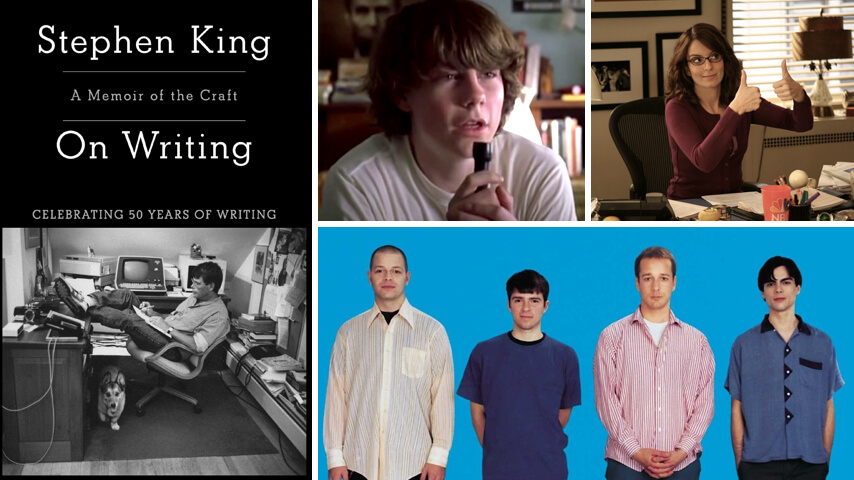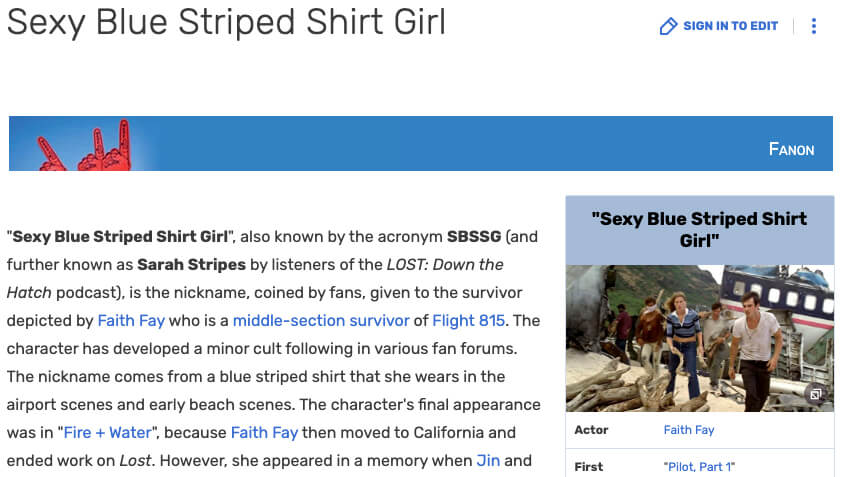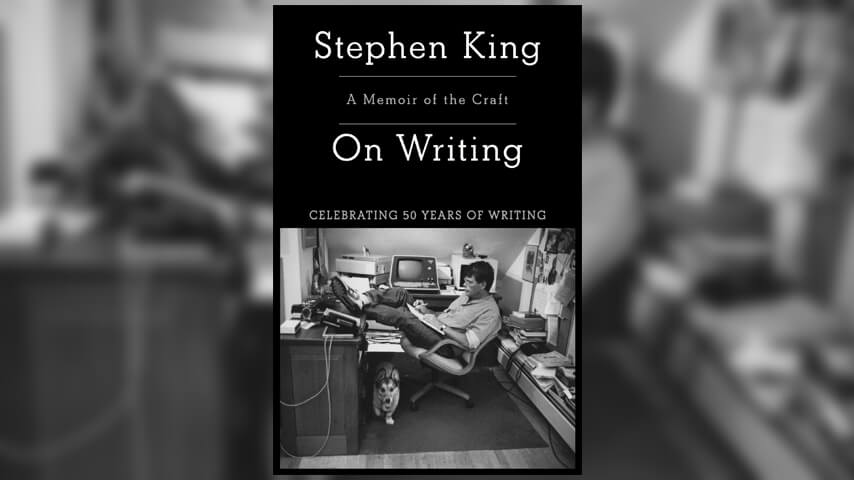AVQ&A: What piece of pop culture inspired you to become a writer?
Whether we watched, listened, or read them, these creative catalysts made us the writers we are today

This week’s question gets a little personal, but it’s a chance to get to know the A.V. Club staff better. We all have an origin story about what got us into this business, so Editor-In-Chief Danette Chavez asked: What piece of pop culture inspired you to become a writer?
As a kid I always based my future on whatever pop culture I was consuming, in sometimes unlikely ways—for a while I wanted to be an attorney because Nancy Drew’s dad was one. More typically, reading Little Women made me want to write books. But the summer my cousins got obsessed with the Will Ferrell Saturday Night Live DVD introduced me to a different kind of writing. Ferrell’s performance makes all the difference, of course, but I realized that someone had to be writing the lines my family couldn’t stop quoting and laughing at. It was a kind of writing that was more immediate, accessible, and communal. I liked TV before, but that lightbulb moment made me fall in love with the craft of television, and made me want to study and understand it and talk about it and obsess over it, and if I was really lucky, write lines someday that people loved and shared with each other as much as my family did with those Will Ferrell sketches. [Mary Kate Carr]
Reading Susan Sontag’s Against Interpretation and James Baldwin’s The Devil Finds Work made me acutely aware of what criticism can (and can’t) accomplish, but it was Weezer’s “No One Else” that first made me think it could be a career. The song, off The Blue Album (a.k.a. the band’s self-titled debut), wormed its way into my 13-year-old brain, with its fuzzy guitars and creepy narrator. I told everyone who’d listen that the catchiness of the song belied its lyrics—hardly the only time this has happened in pop music, I know; again, I was in middle school—and compared it line by line to Robert Browning’s “My Last Duchess.” My composition teacher finally granted everyone a reprieve by asking me to put all of those thoughts in an essay (that wasn’t in my journal). It wasn’t the positive response to the resulting piece that inspired me to keep writing; it was the sense that I had expressed exactly what I meant. That’s a feeling I’m happy to keep chasing. [Danette Chavez]
It’s hard to pinpoint a single piece of pop culture that invoked a desire to pursue writing about TV, although Lost is hugely influential. Another one is Arrested Development because it challenged my perception of what the medium can achieve, automatically making me want to dig deeper into the art of communicating about it. It’s not like Mitchell Hurwitz’s sitcom is the first one I saw and loved, but it certainly made me appreciate the genre in a new light, and how excellent, purposeful, and self-aware scripts and performances can subvert expectations. From the opening minutes of the pilot itself, it both challenged me and made me burst into uproarious laughs. Do I loathe the Netflix reboot? Absolutely. But there’s no denying the first three seasons of AD are remarkably ahead of their time, and I’m grateful it pushed me further into wanting to find a way to write about the impact of such TV as a whole. [Saloni Gajjar]
The idea of being a writer in New York City is a cliche, but it’s one that felt almost mythical to me as a kid. It wasn’t until I saw 30 Rock as a middle schooler that I began to see it for what it really was: a job. Yes, Liz Lemon is well-connected and has a nice apartment, but she also complains about her life near-constantly and wishes she majored in something besides theater tech. That felt real and attainable as someone growing up a couple hours from the nearest major city, and demystified being a writer as something you could achieve like any other career. [Drew Gillis]

I got into Lost around the same time I was advocating to anyone who would listen that The Hunger Games should be taught in schools. I knew I had a penchant for essays and analysis as early as middle school, but I was desperate to write about the things I actually cared about (i.e. not Charlotte Brontë, who I’ve thankfully come around on in recent years). Discovering the late, great Lostpedia forums felt like stepping through a wardrobe into a land where Juliet Burke was as revered as her Capulet namesake. Not only were people having PhD-level debates over extras with (sexy!) blue-striped shirts, but the show’s creators—people I saw as near-gods at the time—were actually listening. It legitimized everything I’d been told for years was too silly or trivial to deserve my time and attention. I convinced my high school English teacher to let me write my senior thesis on the Lost fandom a few years later, and I’m basically still writing it today. [Emma Keates]
Even though I read a lot of books as a child, I always drew on things I learned from listening to music to make my writing really connect. And nothing hit me harder than Jawbreaker’s Dear You. I discovered it for the first time almost a decade after its release, long after the controversy surrounding the band’s major-label debut had calmed down. Because I didn’t experience the uproar in real time, I never really understood how anyone could have anything bad to say about an album that made me feel so much. Frontman Blake Schwarzenbach had always been known for his literary lyrics, but on Dear You, his words found a perfect fusion with the background music, and the two elements interacted with each other in a way I’d never heard before. But it was the album’s fourth track, “Accident Prone,” that made me realize, “I want to use my writing to make other people feel the way I feel when I listen to this song.” It’s the build and the crest and the feeling and the way the words flow together and the floor drops out from under you and you’re suspended for one interminable moment and then the catch at the very last moment and it’s beautiful and terrible and euphoric and punishingly fucking brutally devastatingly sad and it’s everything, bitter and beautiful and too difficult to describe. Feeling that for the first time, that’s when I knew I’d spend the rest of my life trying to make my words mean that much. [Jen Lennon]
Sam Jones’ black-and-white documentary is both a snapshot of Wilco writing and recording Yankee Hotel Foxtrot and, fortuitously (for Jones), a fascinating and frustrating look under the hood of the record industry. (Infamously, Reprise rejected the album, which would go on to become Wilco’s defining work, artistically and commercially, and dropped the band.) But a big takeaway for me, as someone who had just started writing film reviews for my college newspaper when it was released on DVD, came from seeing the Chicago Tribune‘s Greg Kot and Rolling Stone’s David Fricke. I not only appreciated their takes on the band but was very impressed that these guys thought and wrote about cool stuff for a living. It was a reminder that such jobs, though scant, indeed existed, and an inspirational nudge to go for it. [Tim Lowery]

I love Stephen King, and I have since I bucked up the courage to pry one of the paperbacks with the frightening covers off of my mom’s bookshelf when I was in elementary school. His down-to-earth style and engrossing fictions were always made better by his folksy little forwards, where he spoke to us constant readers with affection and vulnerability. That punctured barrier between author and reader only got more permeable in On Writing, his memoir/writing guide that allowed the former English teacher to get nerdy and introspective—which made the magic act of his fiction feel all the more attainable. If ol’ Uncle Steve, who’s lived a bit of a rocky life, could craft such incredible worlds with a little discipline and faith in his imagination, who’s to say I couldn’t professionally put pen to paper? Obviously, that I was a little kid reading what sometimes amounts to a style guide means that I was inclined in this direction anyway, but an author of King’s caliber extending a hand made the dream seem real. [Jacob Oller]
I first saw Almost Famous during the summer before high school. A 13-year-old in an oversized Hendrix t-shirt dying to be in a band, I loved the music and era of Almost Famous but gravitated, as was my wont, toward the dorkiest character in the movie, Cameron Crowe-surrogate William Miller (Patrick Fugit). About seven years and 100 rewatches later, I finished my college hardcore band’s first DIY tour of America’s punk houses, basements and VFW halls. Staying at a friend’s on the final night, I pulled Almost Famous from their DVD collection. Instead of feeling the rock ’n’ roll rush of the road, I returned to Miller, not the band, as my point of relation. This viewing cemented what I long assumed: I like writing about art more than creating it. In other words, I’m uncool. Thankfully, Philip Seymour Hoffman can remind me why that’s a good thing whenever I get drunk on feeling like I belong. [Matt Schimkowitz]
This one is hard to admit given everything that later came out about Joss Whedon, but watching Buffy The Vampire Slayer the first time around was a profound experience for me. Whedon had a way of bending the English language to his will (that should probably have been a red flag right there) that was so specific you could see his influence spread throughout the culture of the late ’90s and early 2000s. It made me think about writing in a whole new way. It was through the Buffy fandom that I met the person who gave me my first paid freelance writing gig in entertainment media. One movie review turned into more, and then suddenly I was interviewing actors, visiting movie sets, and covering events like Comic-Con. It eventually turned into a full-time career. So not only did Buffy The Vampire Slayer inspire me to become a writer, it actually helped make it happen. [Cindy White]
 Keep scrolling for more great stories.
Keep scrolling for more great stories.
